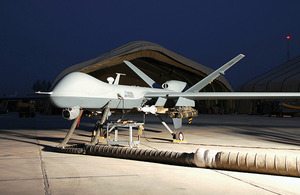RAF's Reaper logs 10,000 hours over Afghanistan
The RAF's Reaper programme has achieved the milestone of providing more than 10,000 hours of armed overwatch in support of UK and coalition forces in Afghanistan.

Royal Air Force Reaper Remotely Piloted Air System [Picture: Antony Loveless, Crown Copyright/MOD 2008]
The UK Reaper Remotely Piloted Air System (RPAS) has been deployed to Afghanistan since October 2007 and provides a persistent, armed intelligence, surveillance and reconnaissance (ISR) capability.
Since November 2009, Reaper has been supporting operations 24-hours-a-day and more Reaper Remotely Piloted Aircraft are planned to be delivered later this year.
The RPAS is an integral part of the UK’s air power capability. Procured to meet an urgent operational requirement, Reaper is the only RPAS currently in service with the RAF.
Air Vice-Marshal Baz North, Assistant Chief of the Air Staff, said:
10,000 hours in direct support of operations is a significant milestone.
Our experience of operating RPAS has confirmed that they have unique capabilities that complement those of traditional combat and ISR platforms; maximum effect is achieved by employing them in a mixed grouping.
This network-enabled force has delivered a comprehensive combat ISTAR [Intelligence, Surveillance, Target Acquisition and Reconnaissance] capability that provides assured intelligence and situational awareness across the full range of operating environments, through the employment and integration of air, space and cyber systems.
Reaper is flown by 39 Squadron via satellite from a UK operations facility at Creech Air Force Base in the Nevada desert, and provides a range of ISR products to troops on the ground and operational headquarters.
Its primary role is ISR but from May 2008 the system has been armed with Hellfire missiles and laser-guided bombs to enable it to better meet the requirements of ground commanders.
The rules of engagement used for Reaper weapon releases are no different to those used for manned combat aircraft; the weapons are all precision-guided, and every effort is made to ensure the risk of collateral damage and civilian casualties is minimised, including deciding not to release a weapon.
Wing Commander Jules Ball, Officer Commanding 39 Squadron, said:
The squadron’s personnel, from pilots to imagery analysts and support teams, are motivated and dedicated to supporting all our coalition forces and the people of Afghanistan; everyone has played a significant part in the delivery of this landmark achievement. It’s absolutely clear that the Reaper plays a vital role in delivering Air’s contribution to operations in Afghanistan.
Our involvement has increased steadily since the MQ-9 Reaper’s introduction into the RAF inventory. In fact, in the last 12 months alone, 39 Squadron has more than doubled its operational flying output.
By supporting coalition forces every minute of every day, there’s no doubt that this cutting-edge capability is saving lives and making a difference to those in danger in Afghanistan.
This article was first published in RAF News, Voice of the Royal Air Force, on 7 May 2010.